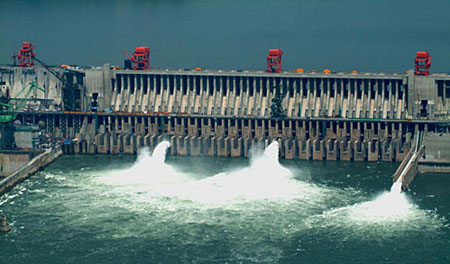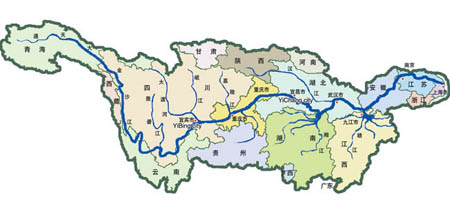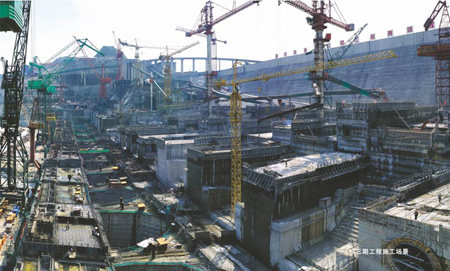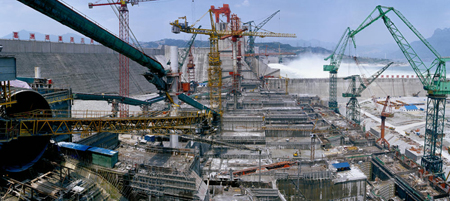China Yangtze Three Gorges Project (TGP), as one of the biggest
hydropower-complex project in the world, ranks as the key project
for improvement and development of Yangtze River. The dam is
located in the areas of Xilingxia gorge, one of the three gorges of
the river, which will control a drainage area of 1 million square
km, with an average annual runoff of 451 billion cubic meters. The
open valley at the dam site, with hard and complete granite as the
bedrock, has provided the favorable topographical and geological
conditions for dam construction.
 |
TGP is a multi-objective development project with great benefits
in flood control, power generation, and navigation and so on. The
project consists of river dam, spillway structures, powerhouse,
buildings for navigation, etc, and organized by the scheme
officially briefed as "developed in one scale, completed in one
time, water-storage by stages, and continuous migration". The dam
is concrete gravity dam, with the spillway in the middle, and the
power house and non-overflow section at both sides. The axial
length of the dam is 2309.47 m, the crest height is 185m, and the
maximum height of the dam is 181m. With a normal storage level at
175m, the total capacity of the reservoir reaches 39.3 billion
cubic meters, of which the effective flood control capacity reaches
22.15 billion cubic meters.
The total period of TGP construction is 17 years, which can be
divided into three phases. Phase I (1993~1997) was designed mainly
to do advance work for project construction and excavation of
diversion channel with the river close-off as the milestone. Phase
II (1998-2003) was mainly designed for construction of spillway and
left-bank power house and the ship lock, with the completion of
initial water storage, commercial operation of first batch of
generators and ship lock open to navigation as several significant
milestones of this phase. Phase III (2004-2009) has the main task
of construction of right-bank dam and powerhouse, which is
symbolized as the commercial operation of all the generator units
and completion of the project.
The official approved static budget for preliminary design of
TGP (based on the price at the end of May 1993 without considering
the factors of price rises and loan interest in the construction
period) is RMB 90.09 billion yuan, of which RMB 50.09 billion yuan
is for the project construction, and the other RMB 40 billion yuan
for the reservoir and migrants resettlement. Once the price rises
and loan interests occurred in the long construction period and
other such factors are considered, the dynamic budget will reach
RMB 203.9 billion yuan.
The funds for the project comes from several sources such as
state investment named Three Gorges Fund, power generation income
of Gezhouba and Three Gorges power plant, loans from the state
development bank and commercial banks, issuance of bonds and
stocks, export credit and so on. The funds is well in place in the
construction period.
By the end of August 2004, a total of RMB 111.6 billion the
fulfilled total has been investment invested since the project
started is RMB 106.653 billion yuan, and the static investment is
RMB 72 73.2 billion yuan, of which 38.95 40.4 billion yuan for the
project and 3 3.05 2.8 billion yuan for the reservoir and
compensation to reservoir impoundment migrants. Considering for the
match between the amount of works and the investment, the
percentage in completed physical work quantity is larger than that
of the investment, which indicates that the budge is well under s
control operates well control. Based on the current conditions,
it's expected to keep the total investment below an be managed
below RMB 180 billion yuan when at the project is completed.
For over ten years as the legal person responsible for the
project, China Yangtze Three Gorges Development Corporation (CTGPC)
persists on organizing the project construction according to market
economic principles, and executes a project construction management
system with legal person responsibility as the core, including
bidding for contractors, management by contracts, constructing with
supervision. In the project construction, the quality is put at the
first place, and management creation is emphasized. In order to
improve the quality management level, a QA system is established
with multi-level control and whole-process supervision. And
considering TGP's features of large scale and great number of
components, the progress control system is established based on the
project management principles and with computer information system
as supplementary. And the so called "static control and dynamic
management" budget system and the contracts based investment
control system are set up, which forms double restricts for the
investment. With all these methods, the factual construction
progress satisfies the complete arrangement of the project, and
project quality conforms with the design, and investment is
controlled within the budget approved by the state.
 |
 |
 |
(China.rog.cn, China Daily, September 28, 2007)